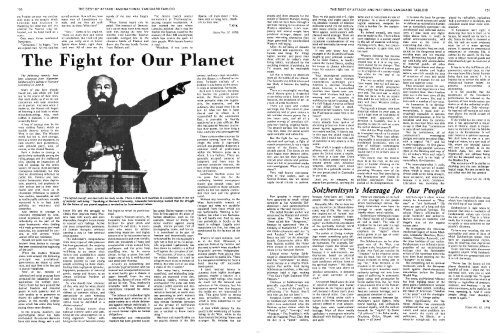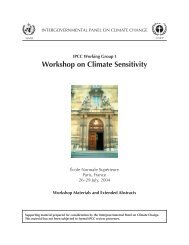THE BEST OF ATTACK! AND NATIONAL VANGUARD TABLOID
THE BEST OF ATTACK! AND NATIONAL VANGUARD TABLOID
THE BEST OF ATTACK! AND NATIONAL VANGUARD TABLOID
You also want an ePaper? Increase the reach of your titles
YUMPU automatically turns print PDFs into web optimized ePapers that Google loves.
130 <strong>THE</strong> <strong>BEST</strong> <strong>OF</strong> <strong>ATTACK</strong>! <strong>AND</strong> <strong>NATIONAL</strong> <strong>VANGUARD</strong> <strong>TABLOID</strong> <strong>THE</strong> <strong>BEST</strong> <strong>OF</strong> <strong>ATTACK</strong>! <strong>AND</strong> <strong>NATIONAL</strong> <strong>VANGUARD</strong> <strong>TABLOID</strong> 131<br />
the Persian emperor was stricken<br />
with anger at the tenacity which<br />
Leonidas had displayed in<br />
thwarting his imperious will. He<br />
ordered the Spartan king be-<br />
headed, and his head fixed on a<br />
stake.<br />
Once more Xerxes summoned<br />
Demaratus.<br />
"Demaratus," he began, "you<br />
are a good man. All you said has<br />
turned out true. Now tell me, h.ow<br />
many men of Laccdaimon re-<br />
main, and are they all such<br />
warriors as these fallen men?"<br />
"'Sire," Demaratus replied,<br />
"there are many men and towns<br />
in Lacedaimon. But I will tell you<br />
what you really want to know:<br />
Sparta alone boasts eight thou-<br />
sand men. All of them are the<br />
equals of the men who fought<br />
here."<br />
When Xerxes heard this he<br />
paled. The memory of Demara-<br />
tus's words must have been much<br />
with him during the next few<br />
months, until Leonidas' Spartan<br />
comrades avenged him at the<br />
climactic battle of Plataea and<br />
drove the Persian horde forever<br />
from Hellenic soil.<br />
The Greeks erected several Sparta, tell them there / You<br />
monuments at Thermopylae, ,have seen us lying here, obedi-<br />
bearing suitable inscriptions. A ent to their laws."<br />
lion marked the spot where T.O'K.<br />
Leonidas perished. But it was the<br />
marker the Spartans raised to the (Issue No. 61, 2978)<br />
memory of their 300 countrymen<br />
which best evokes the spirit of<br />
their people. With laconic brevity<br />
it read:<br />
'!Wanderer, if you come to<br />
The Fight for Our Planet<br />
The following remarks have<br />
been excerpted from Aiexander<br />
Solzhenitsyn 's address at Harvurd<br />
hiiersity on June 8:<br />
Many of you have already<br />
found out, and others wilt] find<br />
out in the course of their lives,<br />
that truth eludes us if we do not<br />
concentrate with total attention<br />
on its pursuit. And even while it<br />
eludes us, the illusion still lingers<br />
of knowing it and leads to many<br />
misunderstandings. Also, truth<br />
seldom is pleasant; it is almost<br />
invariably bitter.<br />
A loss oJ courage may be the<br />
most striking feature which an<br />
outside observer notices in the<br />
Weat in our days. The Western<br />
world has lost its civil courage,<br />
both as a wl~ole and separately, in<br />
each country, each government,<br />
each political party, and, of<br />
course, in the United Nations.<br />
Such a decline in courage is<br />
particular] y noticeable among the<br />
ruling groups and the intellectual<br />
elite, causing an impression of<br />
loss of courage by the entire<br />
society. Of course, there are many<br />
courageous individuals, but they<br />
have no determining influence on<br />
public life. Political and intellectual<br />
bureaucrats show depression,<br />
passivity, and perplexity in<br />
their actions and in their statements<br />
and even more so in<br />
theoretical reflections to explain<br />
-. . < * -<br />
how realistic, reasonable, as well<br />
as intellectually and even morally<br />
warranted it is to base state<br />
policies on weakness and<br />
cowardice.<br />
And decline in courage is<br />
ironically emphasized by occa-<br />
sional explosions of anger and<br />
inflexibility on the part of the<br />
same bureaucrats when dealing<br />
with weak governments and weak<br />
countries, not supported by any-<br />
one, or with currents which<br />
;annot offer any resistance.<br />
Should one point out that from<br />
ancient times decline in courage<br />
has been considered the beginning<br />
of the end?<br />
When the modern Western<br />
states were created, the following<br />
principle was proclaimed:<br />
governments are meant to serve<br />
man, and man lives to be free and<br />
to pursue happiness.<br />
Now, at last, decades of<br />
technical and social progress have<br />
permit Eed the realization of such<br />
aspirations: the welfare state.<br />
Every citizen has been granted the<br />
desired freedom and material<br />
goods in such quantity and of<br />
such quality as to guarantee in<br />
theory the achievement of hap-<br />
piness, in the morally inferior<br />
sense which has come into being<br />
during those same decades.<br />
In the process, however, one<br />
psychologjcal detail has been<br />
overlooked: the constant desire t6<br />
have still more thifigs and a still<br />
"TO dufend oneself, one mwt also be ready to &. Them Ir little such rmdinm In a soc&ty raised in the cult<br />
of mrrtetdal wsll-being. " SpePldag at Huvard University, AJcxander Solzbedtsyn. warned thnt the shdgle<br />
for bhe future of our plahct rcqdm a revolution In fundmental vnloes.<br />
better life and the struggle to<br />
obtain them imprints many Wes-<br />
tern faces with worry and even<br />
depression, though it is customary<br />
to conceal such feelings. Active<br />
and tense competition permeates<br />
all human thoughts without<br />
opening a way to free spiritual<br />
development.<br />
The individuat's independence<br />
from many types of state pressure<br />
has been guaranteed; the majority<br />
of people have been granted<br />
well-being to an extent their<br />
fathers and grandfathers could<br />
not even dream about; it has<br />
become possible to raise young<br />
people according to these ideals,<br />
leading them to physical splendor,<br />
happiness, possession of material<br />
goods, money and leisure, to an<br />
almost unlimited freedom of<br />
enjoyment .<br />
So who should now renounce<br />
all this, why and for what should<br />
one risk one's precious life in<br />
defense of common values, and<br />
particularly in such nebulous<br />
cases when the security of one's<br />
nation niust be defended in a<br />
distant country?<br />
Even biology knows that<br />
habitual extreme safety and well-<br />
being are not advantageous for a<br />
I.iving organism. Today, well-<br />
being in the life of Western society<br />
has begun to reveal its pernicious<br />
mask.<br />
In today's Western society, the<br />
inequality has been revealed of<br />
freedom for good deeds and<br />
freedom for evil deeds. A states-<br />
man who wants to achieve<br />
something important and highly<br />
constructive For his country has to<br />
mov'e cautiously and even -timidly;<br />
there are thousands of hasty and<br />
irresponsible critics around him;<br />
parliament and the press keep<br />
rebuffing him. As he moves<br />
ahead, he has to prove that each<br />
single step of his is well-founded<br />
and absolutely flawless.<br />
Actually an outstanding and<br />
particularly gifted person who has<br />
uhusual and unexpected initiatives<br />
in mind hardly gets a chance to<br />
assert himself; from the very<br />
beginning, dozens of traps will be<br />
set out for him. Thus, mediocrity<br />
triumphs with the excuse of<br />
restrictions imposed by demo-<br />
cracy.<br />
The defense of individual rights<br />
has reached qch extremes as to<br />
make society as a whole defense-<br />
less 'against certain individuals. It<br />
is time, in the West, to defend not<br />
so much human rights as human<br />
obligations.<br />
Destructiv,e and irresponsible<br />
freedom hai beem granted bound-<br />
century, and more than anywhere<br />
else this disease is reflected in the<br />
press. In-depth analysis of a<br />
problem js anathema to the press.<br />
It stops at sensational formulas.<br />
Such as it is, however, the press<br />
has become the greatest power<br />
m within the Western countl-ies.<br />
less space, Society appears to have<br />
tittle defense against the abyss of<br />
human decadence, such as, for<br />
example, misuse of liberty for<br />
moral violence against young<br />
people, motion pictures full of<br />
pornography, crime, and horror.<br />
It is considered to be part of<br />
freedom and theoretically coun-<br />
terbalanced by the young people's<br />
right not to look or not to accept.<br />
Life organized legalistically has<br />
thus shown its inabiIity to defend<br />
itself against the corrosion of evil.<br />
The press too, of course, enjoys<br />
the widest freedom. (I shall be<br />
using the word,press to include all<br />
media). But what sort of use does<br />
it make of this freedom?<br />
How many hasty, immature,<br />
superficial, and misleading judg-<br />
ments are expressed every day,<br />
confusing readers, without any<br />
verification? The press can both<br />
simulate public opinion and mis-<br />
educate it. Thus we may see<br />
terrorists heroized, or secret rnat-<br />
ters pertaining to one's nation's<br />
defense publicly revealed, or we<br />
may witness shameless intrusion<br />
on the privacy of well-known<br />
people under the slogan: "every-<br />
one is entitled to know every-<br />
thing."<br />
Hastiness and superficiality are<br />
the psychic disease of the 20th<br />
more powerful than the legisla-<br />
ture, the executive, and the<br />
judiciary. One would then like to<br />
ask: by what law has it been<br />
elected and to whom is it<br />
responsible? In the communist<br />
East, a journalist is frankly<br />
appointed as a state official. But<br />
who has granted Western journa-<br />
Iists their power, for how tong a<br />
time, and with what prerogatives?<br />
There is yet another surprise for<br />
someone coming from the East,<br />
where the press is rigorously<br />
unified: one gradually discovers a<br />
common trend of preferences<br />
within the Western press as a<br />
whole. It is a fashion. There are<br />
generally ac.cepted patterns of<br />
judgment, and there may be<br />
common corporate interests, the<br />
sum effect being not competition<br />
but unification,<br />
Enormous freedom exists for<br />
the press, but not For the<br />
readership, because newspapers<br />
mostly give enough stress and<br />
emphasis [only] to those opinions<br />
which do not too openly contra-<br />
dict their own and the general<br />
trend.<br />
Without any censorship, in the<br />
West fashionable trends of<br />
thought and ideas are carefully<br />
separated from those which are<br />
not fashionable. Nothing is for-<br />
bidden, but what is not fashiona-<br />
ble will hardly ever find its way<br />
into periodicals or books or be<br />
heard in colleges. Legally your<br />
researchers are free, but they are<br />
conditioned by the fashion of the<br />
day.<br />
There is no open violence, sucb<br />
as in the East. However, a<br />
selection dictated by fashion and<br />
the need to match mass standards<br />
frequently prevent independent-<br />
minded people from giving their<br />
contributions to public life. There<br />
is a dangerous tendency to form a<br />
herd, shutting off successful<br />
development.<br />
I have received letters in<br />
America from highly intelligent<br />
persons, maybe a teacher in a<br />
faraway small college who could<br />
do much for ..the renewal and<br />
salvation of his country, but his<br />
country cannot hear him because<br />
the media are not interested in<br />
him. This gives birth to strong<br />
mass prejudices, to blindness,<br />
which is most dangerous in our<br />
dynamic era.<br />
A fact which cannot be dis-<br />
puted is the weakening of human<br />
beings in the West, while in the<br />
East they are becoming firmer and<br />
stronger. Six decades for our<br />
people and three decades for the<br />
people of Eastern Europe; during<br />
that time we have been through a<br />
spiritual training far in advance of<br />
Western experience. Life's com-<br />
plexity and mortal weight' have<br />
produced stronger, deeper, and<br />
more interesting characters than<br />
those generated by standardized<br />
Western well-being.<br />
After the suffering of decades<br />
of violence and oppression, the<br />
human soul longs for things<br />
higher, warmer, and purer than<br />
those offered by today" mass<br />
living habits, introduced by the<br />
revolting invasion of publicity, by<br />
TV stupor, and by intolerable<br />
music.<br />
All this is visible to observers<br />
from all the worlds of our planet.<br />
The Western way of life is less and<br />
less likely to become the leading<br />
model.<br />
There are meaningful warnings<br />
which history gives a threatened<br />
or perishing society. Such are, for<br />
instance, the decadence of art, or<br />
a Iack of great statesmen.<br />
There are open and evident<br />
warnings, too. The center of your<br />
democracy and of your culture is<br />
left without electric power for a<br />
few hours only, and all of a<br />
sudden crowds of American citi-<br />
zens start tooting, creating havoc.<br />
The smooth surface film must be<br />
very thin, then; the sociai system<br />
quite unstable and unhealthy.<br />
But the fight for our planet,<br />
physical and spiritual, a fight of<br />
cosmic proportions, is not a vague<br />
matter of the future. It has<br />
already started, The forces of evil<br />
have begun their decisive offen-<br />
sive, you can feel their pressure,<br />
and yet your screens and publica-<br />
tions are full of prescribed smiles<br />
and raised glasses. What is the joy<br />
about?<br />
Very well known representa-<br />
tives of your society, such as<br />
George Kennan, say: we cannot<br />
apply moral criteria to politics.<br />
Few speeches in recent years<br />
have generated as much critical<br />
comment as has Alexander Sol-<br />
zhenitsyn's June commencement<br />
address at Harvard University.<br />
The exiled Russian author was<br />
denounced by liberals and conser-<br />
vatives alike. The New York<br />
Times called him "dangerous,"<br />
because he questioned "the ra-<br />
tionality of humankind." A Bos-<br />
ton Globe columnist said that "a<br />
mad Russian" had pulled "a<br />
fancy con job'' on the American<br />
people. Conservative editor Wil-<br />
liam Buckley scolded the Nobel<br />
Prize winner in two consecutive<br />
issues of his NationaI Review.<br />
Liberal writer Arthur Schle-<br />
singer Jr . denounced Solzhenitsyn<br />
and his "irrelevance" to d1emo-<br />
cratic society in a lengthy Wash-<br />
ington Post article. And during<br />
Solzhenitsyh's address, a ~ arvsd<br />
protester held a sign reading<br />
"You Can't Fight Stalinism With<br />
Fascism. "<br />
Critlcism af Solzhenitsyn was<br />
generally superficial ("undemo-<br />
cratic," "a man of the past") or<br />
self-serving ' i n Russia they'd<br />
lock him up; but not here").<br />
Rosalynn Carter's public reply<br />
to ~olzhenitsyn' showed that she<br />
didn't even understand what the<br />
Russian author meant when he<br />
talked of "evil," "courage," and<br />
"fr6edom." The President's wife<br />
told the National Press Clvb that<br />
wt live in a "good" society,<br />
Thus we mix good and evil, right<br />
and wrong, and make space for<br />
the absolute triumph of absolute<br />
evil in the world. On the contrary,<br />
only moral criteria can help the<br />
West against communism's well-<br />
planned world strategy. There are<br />
no other criteria. Practical or<br />
occasional considerations of any<br />
kind will~inevitably be swept away<br />
by strategy.<br />
If you only knew how the<br />
youngest of the [Kremlin] officials<br />
laughs at your political wizards!<br />
As to Fidel Castro, he frankly<br />
scorns the United States, sending<br />
his troops to distant adventures<br />
from his country right next to<br />
yours.<br />
Your shortsighted politicians<br />
who signed the hasty Vietnam<br />
capitulation seemingly gave<br />
America a carefree breathing<br />
pause; however, a hundredfold<br />
Vietnam now looms over you.<br />
That small Vietnam had been a<br />
warning and an occasion to<br />
mobilize the nation's courage. But<br />
if a full-fledged America suffered<br />
a real defeat from a small,<br />
communist half-country, how can<br />
the West hope to stand firm in the<br />
future?<br />
At present, some Western<br />
voices already have spoken of<br />
obtaining protection from a third<br />
power against aggression in the<br />
next world conflict, if there is one.<br />
in this case the shield would be<br />
China. But I would not wish such<br />
an outcome to any country in the<br />
world.<br />
First of all, it is again a doomed<br />
alliance with evil. Also, it would<br />
grant the United states a respite,<br />
but when at a later date China<br />
with its billion people would turn<br />
around armed with American<br />
weapons, America itself would<br />
fall prey to a genocide similar to<br />
the one perpetrated in Cambodia<br />
in our days.<br />
And yet, no weapons, no<br />
matter how powerful, can help the<br />
West until it overcomes its loss of<br />
willpower. In a state of psycho-<br />
logical weakness, weapons be-<br />
come a burden . for the capitula-<br />
ting To side, defend oneself, one must<br />
also be ready to die. There is little<br />
such readiness in a society raised<br />
in the cult of material well-being.<br />
Nothing is left, then, but conces-<br />
sions, attempts to gain time, and<br />
betrayal.<br />
Western thinking has become<br />
conservative: the world situation<br />
should stay as it is at any cost,<br />
there should be no changes. This<br />
debilitating dream of a status quo<br />
is the symptom of a society which<br />
has come to the end of its<br />
development.<br />
The two so-called world wars<br />
have meant intern.al self-destruction<br />
of the small, progressive<br />
West, which has thus prepared its<br />
awn end. The next war - which<br />
does not have to be an atomic<br />
one, and I do not believe it will -<br />
may well bury Western civilization<br />
forever.<br />
Facing such a danger, with such<br />
historical values in your past, at<br />
such a high level of realization of<br />
freedom and, apparently, of<br />
devotion to freedom, how is it<br />
possible to lose to such an extent<br />
the will to defend oneself?<br />
How did the West decline from<br />
its triumphal march to its present<br />
sickness? The West kept advancing<br />
socially in accordance with its<br />
proelaimed intentions, with the<br />
help of brilliant technological<br />
progress. And all of a sudden it<br />
found itself in its present state of<br />
weakness. This means that the mistake<br />
must be at the root, at the very<br />
basis of human thinking in the<br />
past centuries. I refer to the<br />
prevailing Western view of the<br />
world which was first born during<br />
the Renaissance and found its<br />
political expression from the<br />
period of the Enlightenment.<br />
It became the basis for govern<br />
ment and social science and could<br />
be defined as rationalistic human-<br />
ism or humanistic autonomy: the<br />
proclaimed and enforced auton-<br />
omy of man from any higher<br />
force above him. It could be<br />
called anthrapocentricity, with<br />
man seen as the center of<br />
everything that exists.<br />
' It based modern Weslern civili-<br />
zation on the dangerous trend to<br />
worship 'man and his material<br />
needs. Everything beyond physical<br />
well-being and accumulation<br />
of material goods, all other<br />
human requirements and characteristics<br />
of subtler and higher<br />
nature, were left outside the area<br />
of attention of state and socia!<br />
systems, as if human life did not<br />
have any superior sense.<br />
That provided access for evil,<br />
of which in our days there is a free<br />
and cbnstant flow. Mere freedom<br />
does not in the least solve all the<br />
problems of human life, and it<br />
even adds a number of new ones.<br />
As humanism in its development<br />
became more and more<br />
materialistic, it made itself increasingly<br />
accessible to speculation<br />
and manipulation, at first by<br />
socialism and then by communism,<br />
so that Karl Marx was able<br />
to say in 1844 that "communisrn<br />
is naturalized humanism."<br />
Not by coincidence, all of<br />
communism's meaningIess<br />
pledges and oaths are about Man,<br />
with a capital "hl," and his<br />
earthly happiness. At first glance<br />
it seems an ugly parallel: common<br />
traits in the thinking and way of<br />
life of today's West and today's<br />
East. But such is the logic of<br />
materialistic development.<br />
The interrelationship is such,<br />
too, that the current of materialism<br />
which is most to the left<br />
always ends up by being stronger,<br />
more attractive,' and victorious,<br />
because it is more consistent.<br />
Liberalism was inevitably dis-<br />
Solzhen itsyn 's Message for Our People<br />
because Americans are "caring<br />
people" who lead "useful lives."<br />
Naturally, Mrs. Carter does not<br />
sense the evil in the liberal-demo-<br />
cratic way of life. Her stress on<br />
the importance of human hap-<br />
piness and her husband's hypo-<br />
critical cant about "human<br />
rights" are themselves expressions<br />
of the spiritually corrupt world<br />
view which Solzhenitsyn damns-.<br />
The author of Guhg Archipe-<br />
Iago means something quite dif-<br />
ferent when he speaks of evil than<br />
do humanists. For example, Sol-<br />
zhenitsyn rejects the Soviet sys-<br />
tem, he wrote in 1973, "not<br />
because it is undemocratic, au-<br />
thoritarian, based on physical<br />
constraint - a man can live in<br />
such conditions without harm to<br />
his spiritual essence. " His objec-<br />
tion is that "over and above its<br />
physical constraints, it demands<br />
of us total surrender of our<br />
SOUIS.?'<br />
Any system based upon the idea<br />
of material comfort and human<br />
happiness as the highest good is<br />
evil, because it denies man's place<br />
in the natural order. One conse-<br />
quence of living under such a<br />
system is that few Americans will<br />
actively defend or even acknow-<br />
ledge their own xacial-cultural<br />
heritage. Most of them readily<br />
capitulate to outrageous minority<br />
blackmail with feelings of shame<br />
and guilt.<br />
These are examples of the lack<br />
of civil courage in our people<br />
which Solzhenitsyn decries, Not<br />
many Americans even have the<br />
courage to speak openly and<br />
frankly about racial realities.<br />
Solzhenitsyn vehemently rejects<br />
the liberal notion of freedom as<br />
an end in itself, The idea of<br />
freedom for its own sake is a sign<br />
of decadence. Historically an<br />
emphasis on "rights" above<br />
duties grows in an age of social<br />
and cultural decline.<br />
For Solzhenitsyn, as for other<br />
great men of the West, true<br />
freedom is the freedom of self-re-<br />
straint. Any fool can exercise the<br />
"freedom" to do whatever comes<br />
into his head, but the wise man<br />
shows freedom in being able to<br />
say "no." Real freedom is the<br />
freedom to do what is right.<br />
Solzhenitsyn's awesome moral<br />
authority springs not only from<br />
years of suffering in communist<br />
labor camps and persecution by<br />
Soviet authorities, but far more<br />
from a sincere love of his Russian<br />
nation, a deep loyalty to the<br />
Western cultural heritage, and a<br />
passionate devotion to truth.<br />
What a contrast between Sol-<br />
zhenitsyn's quiet dignity, lofty<br />
moral bearing, and unshakable<br />
national loyalty, and the strident<br />
demands for "rights" by Soviet<br />
"dissidents" like Scharansky,<br />
Ginzburg, Orlov, Slepak, and<br />
Begun - all Jews!<br />
SoIzhenitsyn's ideas cannot<br />
simply be denounced ' as "Russian"<br />
or "old fashioned," His<br />
views are part of a long and rich<br />
Western spiritual heritage. He<br />
echoes Plato's affirmation of<br />
social hierarchy and authority,<br />
Burke's stress on tradition, and<br />
Hegel's idea of the organic<br />
nation-state.<br />
He strengthens the American<br />
intellectual legacy of James Madison,<br />
Alexander Hamilton, Henry<br />
Adams, Theodore Roosevelt, and<br />
the other builders of our nation.<br />
Solzhenitsyn is an infinitely better<br />
guardian of our racial-cultural<br />
heritage than the fashionable<br />
writers of the American press who<br />
have been busy pointing out the<br />
"dangers" in his ideas.<br />
His compelling call to spiritual<br />
revolution recalls the European<br />
revolt against liberaldemocratic<br />
materialism before the Second<br />
World War.<br />
For years, the National Alliance<br />
has beer! making many of the<br />
same points Solzhenitsyn stressed<br />
in his Harvard speech, including<br />
the fraud of Arnerican "freedom<br />
of the press'. and the shortsightedness<br />
of U.S. foreign policy.<br />
More significantly, the National<br />
Alliance has consistently<br />
emphasized that our social, economic,<br />
and racial problems are<br />
not merely the result of bad<br />
politicians, the Blacks, or a<br />
minority conspiracy, but stem<br />
piaced by rhdicalism, radicalism<br />
had to surrender to socialism, and<br />
socialism could never resist communism.<br />
If humanism were right in<br />
declaring that man is born to be<br />
happy, he would not be born to<br />
die. Since his body is doomed to<br />
die, his task on earth evidently<br />
must be of a more spiritual<br />
nature. It annot be unrestrained<br />
enjoyment of everyday life. It<br />
cannot be the search for the best<br />
ways to obtain material goods and<br />
then cheerfully get the most out of<br />
them.<br />
It has to be the fulfillment of a<br />
permanent, earnest duty, so that<br />
one may leave life a better human<br />
being than one started it. It is<br />
imperative to review the table of<br />
widespread human values. Its<br />
present incorrectness is<br />
astounding,<br />
It is not possible that the<br />
assessment of the President's<br />
performance be reduced to the<br />
question of how much money one<br />
makes or of the unlimited availa-<br />
bility of gasoline, Only voluntar-<br />
ily inspired self-restraint can raise<br />
man above the world stream of<br />
materialism.<br />
If the world has not come to its<br />
end, it has approached a major<br />
turn in history, equal in Impor-<br />
tance to the turn from the Middle<br />
Ages to the Renaissance. It will<br />
exact from us a spiritual upsurge,<br />
We shall have to rise to a new<br />
height of vision, to a new level of<br />
Iife, where our physical nature<br />
will not be cursed, as in the<br />
Middle Ages, but, even more<br />
importantly, our spiritual being<br />
will not be trampled upon, as in<br />
the Modern Era.<br />
This ascension will be similar to<br />
climbing onto the next anthropo-<br />
logical stage. No one on earth has<br />
any other way left but upward.<br />
from the corrupt and alien values<br />
which have insidiously crept into<br />
the thinking of our people.<br />
Solzhenitsyn is right when he<br />
stresses that only a revolution of<br />
fundamental values can reverse<br />
the tide of evil. That is a bitter<br />
truth, For it .means that there are<br />
no quick or easy solutions to our<br />
people's dilemma.<br />
To have any meaning, the new<br />
spirituality and sense of duty of<br />
which Solzhenitsyn speaks must<br />
have. an organizational expres-<br />
sion. In America, that expression<br />
is given by the National Alliance.<br />
In an interview with Encounter<br />
magazine (April 1976) Solzhenit-<br />
syn said that our greatest task now<br />
is to tell the truth:<br />
"Never has the future of this<br />
planet depended , upon such a<br />
handful of men, I think the first<br />
universal rule, with you as with<br />
us, is not to accept lies. To speak<br />
the truth is to ensure the rebirth of<br />
liberty - regardless of pressure,<br />
interests, and fashions - to say<br />
what one knows, to be truthful, to<br />
keep repeating it. And if some<br />
people shrug their shoulders,<br />
repeat it again. "<br />
M.W,<br />
(Issue No. 62, 1978)
















